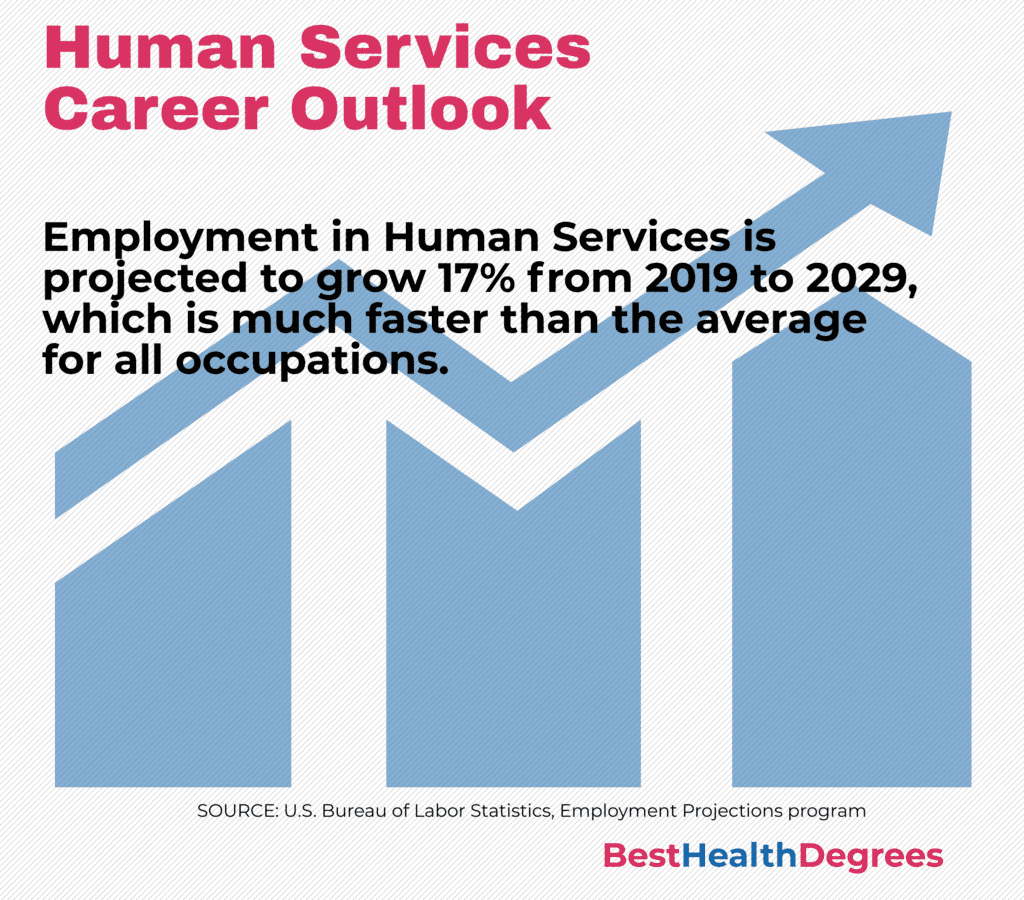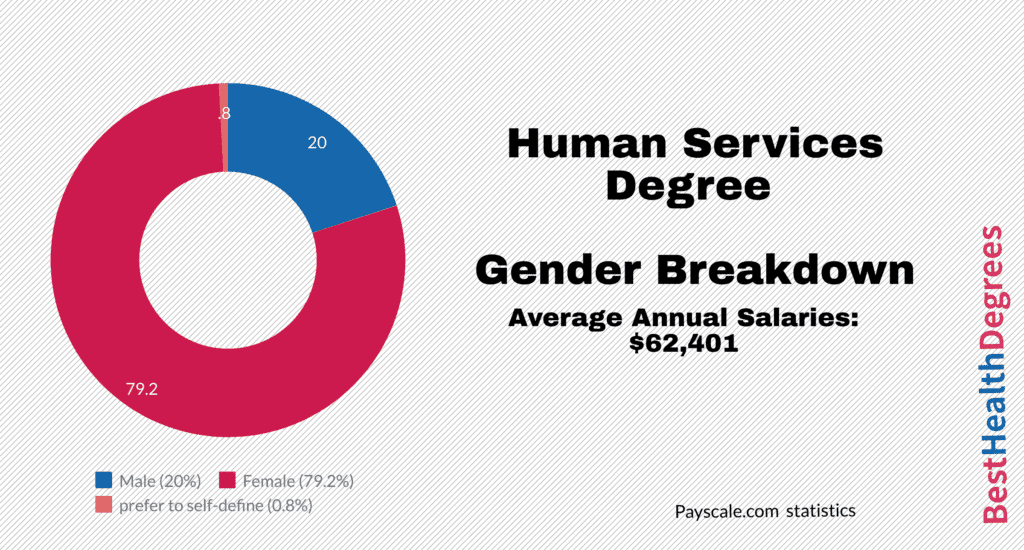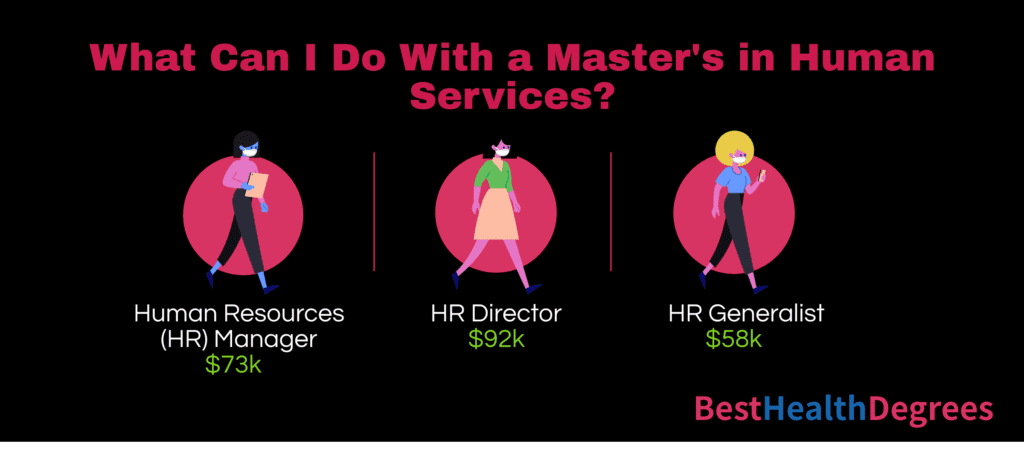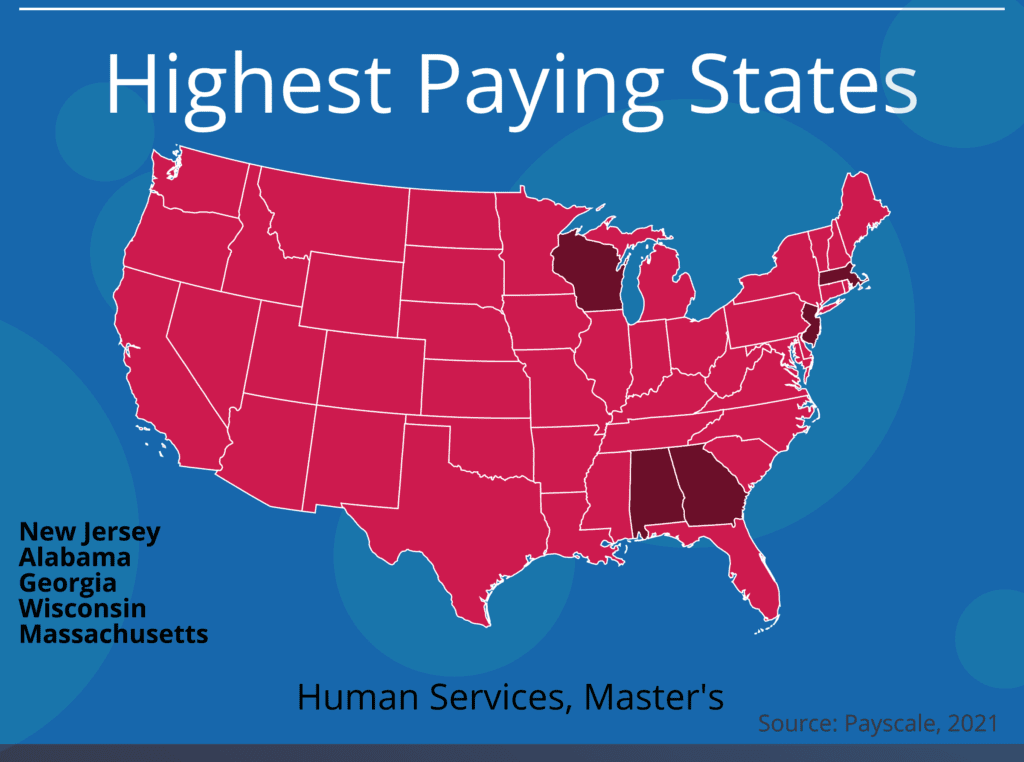Key Takeaways:
- Earning a Master’s in Human Services opens diverse career opportunities in fields like education, public service, and community support.
- Accreditation is crucial for Human Services programs, ensuring quality education that meets set standards.
- Careers with a Master’s in Human Services include roles like rehabilitation counselors, social workers, health educators, and community service managers.
- Specific certifications and licenses may enhance job prospects and credentials in the Human Services field.
- Professional organizations provide human services professionals with resources, networking opportunities, and advocacy platforms.
Every student or working learner who has considered furthering their education in the field of human services will likely ask themselves this pertinent question:
Is a Masters in Human Services worth it?
The short answer is yes because earning a Masters in Human Services is a smart way to open a variety of related professional career choices.
A Masters in Human Services degree program is typically developed to include an interdisciplinary approach, exploring both societal and individual issues from many, if not relevant, perspectives. Many master’s degree programs are designed to create career opportunities in educational areas of program coordination or administration that may include working with the elderly or even young children in youth services.

Accreditation for Human Services Master’s Programs
The process of school or program accreditation is defined as an evaluative process in which qualified and sanctioned accrediting agencies and organizations assess a school or human services program quality – based on the curriculum, student support, learning outcomes, and faculty, among other factors. These relevant factors are set against an approved set of standards, and if the school or program meets the criteria, they are awarded accreditation.
Accreditation happens at two primary levels, which are discussed below.
Regional Accreditation
The process of regional accreditation is a process managed by the federal government through nine Regional Agencies managed by the United States Department of Education manages these agencies (USDE).
Regional accreditation is awarded to colleges, schools, or universities. Each institution of higher learning will be awarded regional accreditation status if the institution of higher education meets the defined educational criteria. These regional accrediting agencies in the United States include –
- The WASC Senior College & University Commission
- The Middle States Commission of Higher Education
- The New England Commission on Higher Education
- The Southern Association of Colleges & Schools Commission of Colleges
- The Northwest Commission on Colleges & Universities
- The Higher Learning Commission
Like most higher learning degrees, undergraduate and a graduate degree in human services will also receive human services accreditation if they voluntarily apply for specialized accreditation. This is discussed next.
Specialized Accreditation
In addition to regional accreditation, colleges, schools, and universities may opt and seek to be awarded specialized accreditation, which is generally administered by industry–sanctioned agencies responsible for setting the criteria required to be awarded specialized accreditation. The primary accreditation agency in the human services industry is the Council For Standards in Human Service Education. An accredited institution ensures that your degree will be taken seriously, so make sure your school search for a master’s in human services hones in on accredited programs.
Council For Standards in Human Service Education
The CSHSE, founded in the late 1970s, is a professional organization developed to facilitate the quality and the consistency of human service academic degrees with the ultimate goal of creating the standards for the best practices in human services through education. The Council for Standards in Human Service Education promotes excellence in education for undergraduate and graduate degree programs. On-campus and Masters in Human Services online accredited programs are available in a variety of disciplines, some of which allow students to customize their human services graduate degree.

Types of Human Services Master’s Degrees
Students with an interest in enrolling in one of the many quality Masters in Human Services degrees available in the education marketplace will find there are more online masters degree in human services options than ever. Graduates who have earned a masters degree in human services online or on-campus find rewarding career opportunities in the areas of public service, policy, and access to benefit programs for individuals, groups, and communities.
Human services online masters degree programs prepare degree graduates for rewarding work in the human services field working for –
- Community Support Organizations.
- Government Institutions.
- Non-profit organizations and agencies.
- Mental Health Services.
- Educational Support Services.
A campus-based or online masters degree in human services enables graduates to help members of the disadvantaged or vulnerable populations through private and public outreach & involvement programs. Many degree candidates enrolled in one of the many available masters degrees in human services programs choose a human service masters degree program that offers the opportunity to focus on a specific sub-group of the overall population which working as –
- Rehabilitation Counselors.
- Social Workers.
- Occupational Therapists.
- Community Service Manager.
- Health Educators.
- Community Service Workers.
- Crisis Response Interventionists.
- Marriage and family therapists.
For human service professionals who wish to move into a managerial or supervisory position, earning a human services masters degree online or on-campus is likely required to meet your objectives.
Core Coursework for Masters in Human Services Degrees
Masters in human services degrees include coursework like – theoretical knowledge, ethical and legal considerations, human services research, and leadership/administrative best practices. More specifically, classes will include –
- Counseling Techniques and Therapeutic Skills.
- Research Methodologies for Human Service Professionals.
- Ethical Policies in Human Services.
- Human Services and the Law.
- Introduction to Human Services Administration, to name a few.
Within most masters degrees in human services programs, degree candidates will find a variety of concentrations. Available academic focuses for various human services online masters degree programs include –
- Social & Community Service Administrators.
- Leadership Administration.
- Family & Child Studies.
- Gerontology.
- Counseling.
- Forensic Behavioral Health, to name a few.
Ultimately, students who wish to earn a masters degree in human services online (or on-campus) want to make a significant difference in other people’s lives – at the individual or community level. Graduates of human services masters degree online programs typically have career objectives to be of service to the world and others, making a difference, one person at a time.
Certifications/Licenses for Human Services
You may already have a bachelor’s degree and just want to advance without a master’s. Certification credentialing and licensing is a practical way that allows potential employers to understand one’s qualifications and career commitment. Possessing the right credential or certification can be a valuable addition to one’s resume. The most well-known is licensed clinical social worker, but in the field of human services, here are a few of the most popular certifications –
The Center for Credentialing and Education (CCE)
The Center for Credentialing and Education, in combination with the National Organization of Human Services, offers the HS – BCP – the Human Series – Board Certified Practitioner credential. The CCE credential promotes relevant ethical standards and professionalism throughout the industry.
The National Board of Certified Counselors (NBCC)
The National Bd. of Certified Counselors (the “NBCC”) offers the NCC credentialing for those human service professionals who wish to specialize in counseling. Applicants must have a counseling (or related) degree, pass an exam, and provide sufficient work and supervision experience plus a professional colleague’s endorsement.
Additionally, the NBCC offers the MAC (Master Addictions Counselor) credential for those human service professionals who wish to work with those challenged by substance abuse issues.
The Council on Social Work Education
The Council on Social Work Education offers a variety of credentials, which may differ from state to state.
It is also noted that many states now require or recommend that those human service workers in community health environments hold some form of legislated credentials to practice work in those states legally. As such, students with an interest in community service should confirm with the state (or territory) to determine the exact training, evaluation, and experience needed to practice in accordance with the local law.

Advanced Masters in Human Services Careers
Many master of human services jobs are available with highly competitive salaries and a slew of excellent benefits. These and other benefits are the primary reasons why many graduate degree holders find that many careers with a masters in human services degree are so appealing. But before you decide which of the many master in human services career options may be best to meet your particular educational and career goals, answer these questions as honestly as you can –
- Of the available masters in human services jobs, which do you think would suit your personality and goals best?
- Which of the available jobs with a master in human services would meet all of your budgetary needs or goals?
- Are there master in human services jobs that are available in the area in which you live?
- Are you willing to relocate if there were available jobs for masters in human services graduates elsewhere in the state or country?
- Are there jobs with a masters in human services degree that can be performed online as remote work?
The available advanced jobs for masters in human services degree holders include working these sectors of the health, community, and public policy –
- Case manager.
- Child advocate.
- Crisis intervention specialist.
- Domestic violence worker.
- Health Educator.
- Grief Counselor.
- Social Worker.
- Rehabilitation caseworker.
- Substance Abuse counselor.
- School counselor.
- Sociologist.
- Youth Worker.
- Public health worker.
- Mental health specialist.
- Occupational therapist.
- Probation officer.
- Geriatric social worker.
- Palliative care worker.
- Public administrator, to name a few.
Despite the exact academic or professional path one takes when they are qualified for the many masters in human services jobs; there is typically a high demand. The reality is many master in human services jobs may help change the world, one client at a time.
Human Services Salary Potential
Individuals who hold a human services masters degree have numerous career options from which to choose. Some work in private practice, but most human services workers work for government agencies or in the criminal justice system. These potential human services careers include the following –
- Substance Abuse, Behavioral Disorder & Mental Health Counselors
- Social & Community Service Managers.
- Social Workers.
- Marriage & Family Therapists.
- Rehabilitation Counselors.
- Probation or Correctional Treatment Officers.
- Childcare Workers.
- Home Health or Personal Care Workers.
- Community Health Workers or Health Educators, among others.
Each of these masters in human services salary options is discussed in detail below.

Substance Abuse, Behavioral Disorder & Mental Health Counselors
According to the statisticians at the BLS, there were more than 280,000 substance abuse/behavior disorder & mental health counselors working in the United States in 2019. Here is the salary percentile data for those individual working as substance abuse, behavioral disorder, or mental health counselors during 2019 –
| Salary Percentile Data | Masters Degree in Human Services Salary | Master in Human Services Salary – Hourly |
|---|---|---|
| 10% | $ 29,510 per year | $ 14.19 per hour |
| 25% | $ 35,960 per year | $ 17.29 per hour |
| 50% (Median) | $ 46,240 per year | $ 22.23 per hour |
| 75% | $ 59,650 per year | $ 28.68 per hour |
| 90% | $ 76.080 per year | $ 36.58 per hour |
Social & Community Service Managers
According to the statisticians at the BLS, there were more than 175,000 social and community service managers working in the United States in 2019. Here is the salary percentile data for those individual working as substance abuse, behavioral disorder, or mental health counselors during 2019
| Salary Percentile Data | Masters Degree in Human Services Salary | Master in Human Services Salary – Hourly |
|---|---|---|
| 10% | $ 41,220 per year | $ 19.82 per hour |
| 25% | $ 52,480 per year | $ 25.23 per hour |
| 50% (Median) | $ 67,150 per year | $ 32.38 per hour |
| 75% | $ 88,180 per year | $ 42.39 per hour |
| 90% | $ 112,480 per year | $ 54.08 per hour |
Social Workers
According to the statisticians at the BLS, there were more than 700,000 social workers working in the United States in 2019. Here is the salary percentile data for those individual working as substance abuse, behavioral disorder, or mental health counselors during 2019 –
| Salary Percentile Data | Masters Degree in Human Services Salary | Master in Human Services Salary – Hourly |
|---|---|---|
| 10% | $ 4,210 per year | $ 16.45 per hour |
| 25% | $ 43,570 per year | $ 20.95 per hour |
| 50% (Median) | $ 61,230 per year | $ 29.44 per hour |
| 75% | $ 78,720 per year | $ 37.84 per hour |
| 90% | $ 90,800 per year | $43.65 per hour |
Marriage & Family Therapists
According to the statisticians at the BLS, there were more than 65,000 substance abuse/behavior disorder & mental health counselors working in the United States in 2019. Here is the salary percentile data for those individual working as substance abuse, behavioral disorder, or mental health counselors during 2019 –
| Salary Percentile Data | Human Services Salary | Human Services Salary – Hourly |
|---|---|---|
| 10% | $ 32,070 per year | $ 15.42 per hour |
| 25% | $ 37,740 per year | $ 18.14 per hour |
| 50% (Median) | $ 49,610 per year | $ 23.85 per hour |
| 75% | $ 64,630 per year | $ 31.07 per hour |
| 90% | $ 87,700 per year | $ 42.16 per hour |
Rehabilitation Counselors
According to the statisticians at the BLS, there were more than 115,000 rehabilitation counselors working in the United States in 2019. Here is the salary percentile data for those individual working as substance abuse, behavioral disorder, or mental health counselors during May 2019 –
| Salary Percentile Data | Masters Degree in Human Services Salary | Master in Human Services Salary – Hourly |
|---|---|---|
| 10% | $ 23,820 per year | $ 11.45 per hour |
| 25% | $ 28,140 per year | $ 13.53 per hour |
| 50% (Median) | $ 35,950 per year | $ 17.28 per hour |
| 75% | $ 28,110 per year | $ 23.13 per hour |
| 90% | $ 63,790 per year | $ 30.67 per hour |
Probation or Correctional Treatment Officers
According to the statisticians at the BLS, there were more than 90,000 probation officers and correctional treatment specialists working in the United States in 2019. Here is the salary percentile data for those individual working as substance abuse, behavioral disorder, or mental health counselors during May 2019 –
| Salary Percentile Data | Human Services Salary | Human Services Salary – Hourly |
|---|---|---|
| 10% | $ 36,370 per year | $ 17.49 per hour |
| 25% | $ 43,040 per year | $ 20.69 per hour |
| 50% (Median) | $ 54,290 per year | $ 26.10 per hour |
| 75% | $ 72,450 per year | $ 34.83 per hour |
| 90% | $ 94,860 per year | $ 45.61 per hour |
Childcare Workers
According to the statisticians at the BLS, there were more than 1,000,000 childcare workers working in the United States in 2019. Here is the salary percentile data for those individual working as substance abuse, behavioral disorder, or mental health counselors during May 2019 –
| Salary Percentile Data | Salary | Salary – Hourly |
|---|---|---|
| 10% | $ 18,000 per year | $ 8.65 per hour |
| 25% | $ 20,210 per year | $ 9.72 per hour |
| 50% (Median) | $ 24,230 per year | $ 11.65 per hour |
| 75% | $ 29,220 per year | $ 14.05 per hour |
| 90% | $ 35,800 per year | $ 17.21 per hour |
Home Health or Personal Care Workers
According to the statisticians at the BLS, there were more than 3,300,000 home health & personal care aides working professionally in the United States in May 2019. Here is the salary percentile data for those individual working as substance abuse, behavioral disorder, or mental health counselors during May 2019 –
| Salary Percentile Data | Masters Degree in Human Services Salary | Master in Human Services Salary – Hourly |
|---|---|---|
| 10% | $ 32,680 per year | $ 15.71 per hour |
| 25% | $ 44,680 per year | $ 45.65 per hour |
| 50% (Median) | $ 61,210 per year | $ 29.43 per hour |
| 75% | $ 81,290 per year | $ 39.08 per hour |
| 90% | $ 104,000 per year | $ 50.10 per hour |
Community Health Workers or Health Educators
According to the statisticians at the BLS, there were more than 120,000 health educators and community health workers working in the United States in 2019. Here is the salary percentile data for those individual working as substance abuse, behavioral disorder, or mental health counselors during May 2019 –
| Salary Percentile Data for Community Health Workers | Masters Degree in Human Services Salary | Master in Human Services Salary – Hourly |
|---|---|---|
| 10% | $ 26,660 per year | $ 12.82 per hour |
| 25% | $ 32,850 per year | $ 15.79 per hour |
| 50% (Median) | $ 40,360 per year | $ 19.41 per hour |
| 75% | $ 52,850 per year | $ 25.41 per hour |
| 90% | $ 68,350 per year | $ 32.86 per hour |
Professional Organizations in Human Services
Professional organizations are found in most established industries as they are designed as the voice and professional advocate for the industry overall. While the exact purpose and responsibilities of the professional organization may differ – contingent upon the mission of the agency, most professional organizations seek to create, administer and implement an accrediting process for education programs training the professionals in that specific industry.
Human services professionals, fortunately, have the opportunity of selecting to join one or more of the various professional organizations dedicated to the business of human services.
Membership to any one of the available human services professional organizations offers professionals the chance to meet and/ r collaborate with other colleagues, experts, and scholars in the field of human services. In addition, membership in a human services professional organization offers members these benefits –
- Career and job boards.
- Advocacy opportunities.
- Mentorships.
- Continuing Education.
- Accreditation.
- Credentialing.
- Web resources.
- Affiliate partnerships.
- Annual conferences on a local, state, regional, or even global level.
- Licensure, among others.
The American Public Human Services Association (APHSA)
The American Public Human Services Assoc. (“APHSA”) is a professional organization on a mission to connect members from local, state, and/or private health services fields in ways that allow them to collaborate and create positive and influential policy change easily. Additionally, the APHSA seeks to create the necessary industry expertise by providing a network that permits the free & open exchange of ideas and resources by providing online opportunities and in-person conferences. Membership is available as an individual or through state or local and agencies.
The National Organization For Human Services (NOHS)
The National Organization for Human Services offers these professionals the ability to network with other members and contacts in ways that foster the growth of the human services field. Membership includes access to publications, discounted conferences, eligibility to scholarships and grants, job postings, and discussion forum access.
The American Counseling Association (ACA)
Established in the early 1950s, the American Counseling Association is a nonprofit professional organization that is also the globe’s largest organization that is dedicated to the promotion and growth of the counseling profession. The ACA’s mission is to ensure that every individual has access to the quality counseling and therapy that allows them to thrive as an individual. ACA membership offers insurance discounts as well as other valuable benefits like educational opportunities, mentorships, publications, a career job, and networking opportunities.
The Association of Addictions Counselors (NAADAC)
Founded in the early 1970s, the Association of Addictions Counselors began with the simple goal of creating a well-educated field of professional counselors with the professional skills to treat the many varieties of addiction successfully. The NAADAC has affiliates in nearly all states as well as internationally to help those treating those facing the challenges of addiction from prevention, intervention, and recovery, among others. The NAADAC also provides career networking opportunities, plus comprehensive continuing-education options, insurance, and professional materials discounts.
The National Association of Social Workers (NASW)
Founded in the mid 1950s, the National Association of Social Workers boasts a membership of more than 110,000 members worldwide. The NASW seeks to enhance the professional development in the field of social work, plus the development of each of its members. NASW members have the opportunity to connect with other social work professions, which offers the opportunity to –
- Advance their careers.
- Advocate for their client’s interests.
- Gain a mentorship.
- Take advantage of discounts on insurance and other professional materials.